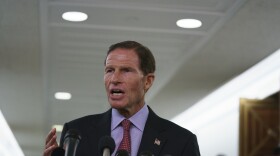-
A new law in New York will hold corporate polluters responsible for damage to the environment. The biggest producers of greenhouse gas emissions will pay about $75 billion over 25 years.
-
In Connecticut, the New Haven Port and the New London Pier have been selected to receive nearly $40 million from the federal Environmental Protection Agency to help reduce greenhouse emissions.
-
Connecticut will have access to fossil-free fuel within the state for the first time. U.S. Sen. Richard Blumenthal (D-CT) visited the East Haven terminal where Global Partners, an independent energy supplier, will store its renewable diesel.
-
The Connecticut House of Representatives approved a controversial Democratic climate change bill. It passed along party lines after several hours of debate that reflected a sharp divide between Democrats and Republicans.
-
Electric vehicles have been a hot topic in Connecticut over the last year. The legislature will soon vote on a bill that would create a roadmap to an electric future. WSHU’s Sabrina Garone and Molly Ingram discussed Connecticut’s long history with EVs.
-
The bill would create an Electric Vehicle Infrastructure Coordinating Council — a working council to explore the state’s options as they promote electric vehicle sales to slow greenhouse gas emissions. GOP leaders worry it will become an EV mandate.
-
A state initiative being rolled out in New York is supplying funding to support school districts transitioning from diesel to electric school buses. Officials say the program could supercharge the state’s goal to achieve 40% reduction in greenhouse gas emissions by 2030.
-
Connecticut Senate Republicans have proposed a plan to reduce greenhouse gas emissions in the state, without requiring an electric vehicle mandate supported by the Democratic majority.
-
Last fall, Gov. Ned Lamont pulled regulations that would have required that all new cars sold in CT beginning in 2035 be zero-emission. Now what?
-
A study finds that the two most prominent models addressing the cost of dealing with climate change disagree on the price tag of mitigation.
Play Live Radio
Next Up:
0:00
0:00
Available On Air Stations










